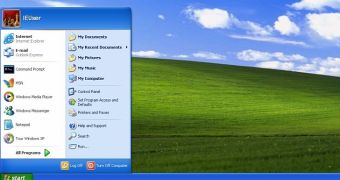Windows XP support will come to an end on April 8, 2014, so in less than 30 days, the operating system will stop receiving updates and security patches, which means that it’ll be more or less vulnerable to attacks over the Internet.
That’s not at all a good thing and it’s pretty clear that without security patches, a Windows computer would be really easy to hack.
And still, 29 percent of the desktop computers worldwide are still powered by Windows XP, which is pretty clear a sign that Microsoft’s ancient operating system won’t die anytime soon. In fact, it will most likely continue to be around for a few more years, at least until software developers across the world pull the plug on Windows XP support completely.
OK, so since it’s so important to move to an operating system that has what it takes to keep you fully protected and avoid getting your data compromised, why are so many users still running Windows XP right now?
Since we’ve published so many articles on Windows XP lately (and some of you actually criticized us for doing it), we’ve heard quite a lot of opinions on why XP users should refuse to upgrade and stay on this particular OS version.
Basically, it all comes down to only two very simple things.
People didn’t use Windows Update anyway
You might not be surprised by it, but plenty of Windows XP computers are running a pirated copy of the operating system, which means that most users have decided to disable Windows Update in order to make sure that they aren’t asked for an activation key.
Since no security updates and patches were delivered to their computers, users were only relying on anti-virus products and firewalls, which is exactly what they need to do after April 8.
This pretty much means that even though Microsoft pulls the plug on Windows XP support, nothing is going to change for many users since they have been doing almost the same thing for years.
What’s more, many security companies out there have already announced that their products would continue to run on Windows XP for at least two more years, so virus definition updates and new improvements would continue to be provided even if you run the same old operating system.
Moving from Windows XP is a very expensive process
If you decide to switch from Windows XP to Windows 8.1, for example, hardware upgrades are clearly necessary if you haven’t changed your computer in a while.
Basically, a Windows XP computer wouldn’t be able to run Windows 8.1, not only because it has higher system requirements, but also because Microsoft has implemented some technologies that weren’t supported by devices produced 13 years ago.
Here are the system requirements of Windows 8.1:
Processor: 1 gigahertz (GHz) or faster with support for PAE, NX, and SSE2 (more info) RAM: 1 gigabyte (GB) (32-bit) or 2 GB (64-bit) Hard disk space: 16 GB (32-bit) or 20 GB (64-bit) Graphics card: Microsoft DirectX 9 graphics device with WDDM driver
And here are those of Windows XP:
Pentium 233-megahertz (MHz) processor or faster (300 MHz is recommended) At least 64 megabytes (MB) of RAM (128 MB is recommended) At least 1.5 gigabytes (GB) of available space on the hard disk CD-ROM or DVD-ROM drive Keyboard and a Microsoft Mouse or some other compatible pointing device Video adapter and monitor with Super VGA (800 x 600) or higher resolution Sound card Speakers or headphones
Of course, a new computer is very expensive, even though Microsoft is struggling to bring more affordable devices to the market. But don’t only think about just one Windows XP user, think about large companies that need to upgrade hundreds, maybe thousands of computers to Windows 8.1. In such a case, the migration could clearly be a very costly decision, that’s for sure.
In the end, there might be many other reasons to stick to Windows XP beside these two mentioned here. We’ve also heard that users don’t like Windows 8.1 enough to abandon XP, so this is clearly a matter of choice that Microsoft needs to deal with. The company has to make its future operating systems more appealing for the end user in such a way that more people would want to give it a try.
Instead of a conclusion, we’re going to end the article with this video showing Steve Ballmer trying to convince users to buy Windows XP. Just look how hard they’re trying and then have a look at the poor Windows 8 marketing efforts.

 14 DAY TRIAL //
14 DAY TRIAL // 